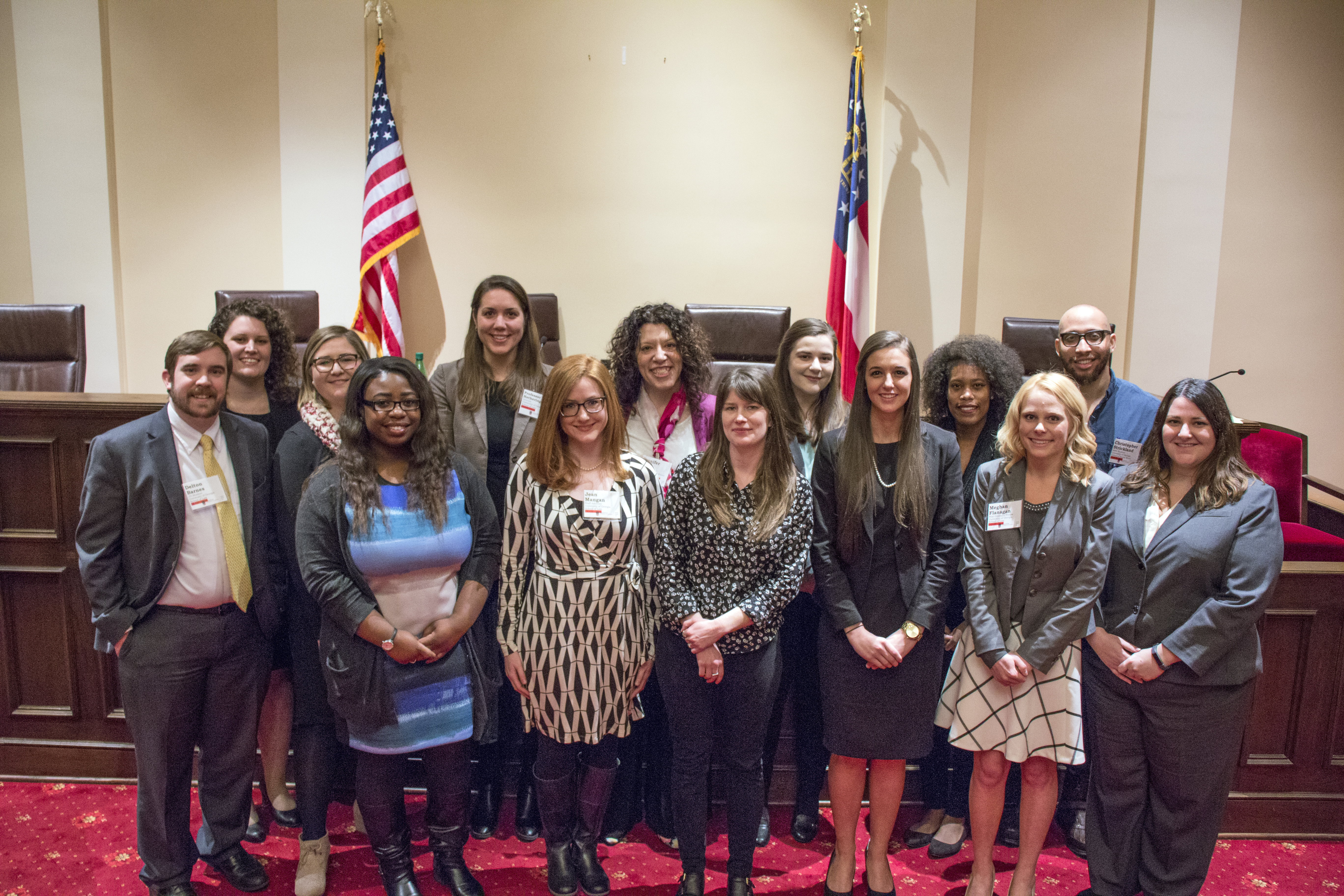Ten graduate students stood in the Hatton Lovejoy Courtroom as Judge Jerry Bruce called the court to order. A fictitious but all-too-familiar case commenced. A 10-year-old boy had been taken from his parents after alleged abuse by the father and neglect from the mother.
Although the students had studied child maltreatment, the setting was new for six of them. They were the first master’s degree candidates from the School of Social Work to participate in a mock trial in which they played key roles.
Each client brought an earnest perspective to the table. The state petitioned for termination of parental rights, the mother for sole custody and the father for full custody for both parents. The attorneys began calling expert witnesses. One by one the students took the stand—one as a case manager from the Department of Family and Child Services, one as a forensic interviewer, others as the child’s therapist and the mother’s therapist. Their testimony was meticulously examined and cross-examined. Some attorneys—played by law students—attempted to cloud their expert opinions, while others sought to prove their legitimacy.
The event was a first in Georgia, where nearly 14,000 children are currently in foster care. Of that number, an estimated 50 percent will receive a termination of parental rights ruling from the juvenile court system. Social workers play a key part in those rulings because they are often called to testify as expert witnesses. However, this is an area few social work programs touch upon in their curricula, and few new social workers understand what is expected of them. Similarly, mock trial programs in law schools rarely focus on cases involving juvenile court. As a result, too often collaboration between lawyers and social workers fails families.
An innovative partnership between the UGA School of Law and School of Social Work aims to strengthen lines of communication and better prepare future professionals. The partnership is led by Emma Hetherington, the director of the Wilbanks Child Endangerment and Sexual Exploitation, or CEASE, Clinic and Jennifer Elkins, an associate professor at the School of Social Work and an expert in child maltreatment and trauma-informed care.
“It wasn’t just a mock trial; it was a demonstration of what trauma-informed care in the courtroom looks like,” said Elkins. “The goal was to increase knowledge and skills related to child sexual abuse, child welfare law and trauma-informed practices for both law students and social work students.”
Trauma-informed care—understanding, recognizing and responding to the effects of all types of trauma and ensuring that practices don’t re-traumatize a client—was central to the court case.
The law students provided representation for the child but did not require his physical presence in the courtroom. He did not have to share a room with his abuser or hear detailed accounts of his trauma, but his wishes were well represented.
The mother, a victim of domestic violence at the hands of the father, sat on the other side of the room from her husband. Usually the parents are positioned next to one another.
Social work students provided testimony grounded in practices that were developmentally sensitive, evidence informed and trauma specific. Additionally, the attorneys and experts worked together to build their cases.
“This is rarely done, if ever,” said Hetherington. “Typically, the two sides work separately. By working together, the different members of the family could feel as if they had a ‘team’ or support system behind them that they may not otherwise have had.”
After a break, the case came to a head as Judge Bruce called the court to order once again, this time to deliver one of the only unscripted addresses of the trial: the verdict. In his expert opinion, Bruce ruled that the abusive father lose all parental rights while the mother retain her rights and the child return to her care after more than a year of separation. In the most compelling portion of his ruling, the judge referred to the expert testimony of the mother’s therapist, played by Molly Murphy, a second-year student in the School of Social Work’s master’s degree program.
His decision effectively hinged on her testimony of the mother’s persistent efforts to complete her case plan through therapy, parenting classes and visitation. Murphy’s trauma-informed understanding of the mother’s actions as a survivor of domestic violence provided the perspective the court needed to rule in her favor.
Elkins and Hetherington plan to continue the collaboration and involve psychology students, pre-med students and even police officers.
By raising awareness of how trauma-informed practices can be implemented in courtrooms, they hope to see an interdisciplinary paradigm for well being become standard procedure in juvenile court and child welfare systems.


